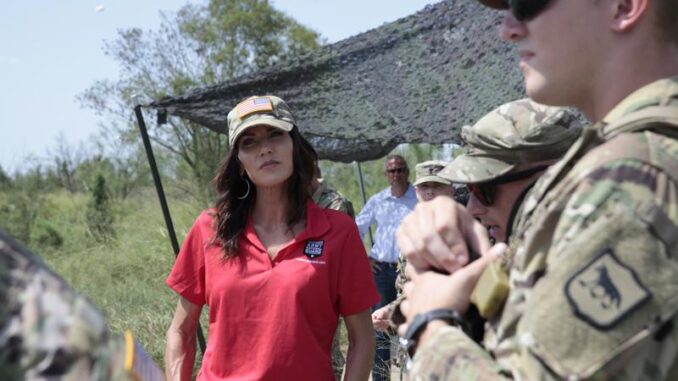
SIOUX FALLS, S.D. (AP) — The head of the South Dakota National Guard said Wednesday that Gov. Kristi Noem didn’t tell him she would use a private donation for the deployment to the U.S. border with Mexico until after the mission was already planned.
Noem’s decision to accept a $1 million donation from a Tennessee billionaire last month was met with hefty criticism from those who said it allowed a private donor to commandeer a military force. But Maj. Gen. Jeffery Marlette told a legislative budgeting committee Wednesday that the donation was not a factor in planning the deployment.
“Our National Guard is not for hire,” he told lawmakers. “Nowhere in this planning process was there a discussion of, ‘I’ll go send the Guard if I can find somebody to pay for it.’”
The Republican governor last month described the $1 million donation offer from billionaire Republican donor Willis Johnson as a “surprise” that came as she was deciding whether to send police officers or National Guard troops, as well as how to fund the deployment. The state was responding to a request from Texas and Arizona to send law enforcement officers under an agreement between states to assist during emergencies
The costs for the two-month deployment will likely run over Johnson’s $1 million. Marlette said the Guard expects to spend over $1.3 million by the middle of September. That will be paid from the state emergency and disaster fund, which is overseen by an agency tasked with preparing the state for natural disasters or other emergencies. Johnson’s donation will flow through the fund, but lawmakers questioned how much money the fund already has and whether they will be asked to fund it during next year’s legislative session.
Marlette defended the deployment of 48 soldiers as helping halt the flow of drugs, calling the border a “doorway” for meth and other dangerous drugs in South Dakota. He said Guard members have seen evidence of Mexican cartels fighting over control of the border crossings.
“Our governor said this is a national security, this is a drug issue, this is important to South Dakota,” Marlette told the lawmakers.
National Guard members have also assisted families who are crossing to claim asylum, including at one point helping deliver a baby and performing CPR on a dying 2-year-old child, Marlette said.
The governor said she was considering extending the National Guard’s deployment after visiting the National Guard members last month, but Marlette said he did not have any updates on whether the deployment would last beyond another month. Guard members are paid a daily rate ranging from $200 to $248, plus a daily food allowance of $55. Those salaries, plus the costs of transporting equipment, paying for hotels and transportation, make up the bulk of the expense for the deployment, according to Marlette.
Several lawmakers questioned how the deployment would be funded if the governor decides to extend it. Democratic Sen. Reynold Nesiba said the state funding issue was “complicated” by the private donation.
The governor’s spokesman Ian Fury said her office has requested reimbursement from Texas, but does not anticipate them paying anything. He added that she plans to continue using the emergency and disaster fund for the deployment.
“Gov. Noem has extended the deployment for an additional 30 days. They will continue to deliver on the mission objectives of protecting the border, intercepting illegal immigrants, and providing drug interdiction against the cartels,” Fury said.
South Dakota is also expected to send 125 soldiers for a yearlong deployment as part of a separate federal mission later this year. That deployment will be funded by the federal government.
